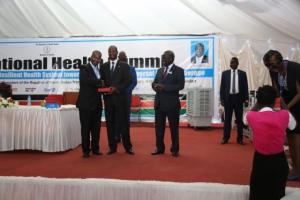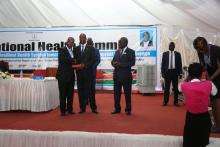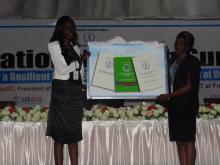South Sudan’s National Health Summit unites Government and partners to revitalize efforts toward building a resilient health system for people facing multiple challenges
Juba, 31 March 2017 - More than 500 participants took major steps to improve people’s health across local, state and national levels at the third National Health Summit for South Sudan, which concluded today. Considering the challenges and opportunities of delivering health in South Sudan, participants sought to establish a clear vision for health in the years ahead.
“A health system, which cannot protect children from vaccine preventable diseases, cannot deliver on universal health coverage,” said H.E. Gen. Taban Deng Gai, First Vice President of the Republic of South Sudan.”
The Republic of South Sudan’s Ministry of Health convened the Summit to encourage partners to work together with the Ministry and others for building a well-functioning resilient health system looking towards the larger goal of achieving Universal Health Coverage.
At the conclusion of the five-day event, the First Vice President H. E. Taban Deng Gai, announced the launch of the new National Health Policy (2016-2026), along with other plans intended to support it. The Policy seeks to guide efforts to improve people’s health status by considering solutions to overcome a weak health system and drivers of poor health. To operationalize the Policy, a roadmap to finalize the Health Sector Strategic Plan for the next five years was outlined.
“The National Health Summit has united our Government at all levels to carry forward our work on delivering health services across South Sudan,” Hon. Dr Riek Gai Kok, said. “We have a clear path for the next ten years, and we are committed to doing our part, and for success ask for our partners and other parts of Government to do theirs.”
Juba Declaration on Health
Considering the Summit’s, "Harnessing strong partnerships for a resilient health system towards attainment of Universal Health Coverage," organizers and participants endorsed the Juba Declaration on Health, which calls for working with the Government of the Republic of South Sudan and health sector partners to build a resilient health system to deliver comprehensive health services to all citizens of the Republic of South Sudan guided by the National Health Policy (2016-2026) and underpinned by ongoing, forthcoming and emerging policies, strategies, guidelines and other efforts. The Declaration also encourages governments to invest 15% of national budgets in health.
Partners keen to support efforts to improve people’s health in South Sudan
The World Health Organization (WHO) served as one of the Summit’s key supporting partners.
“The National Health Summit galvanized plans and actions by South Sudan’s health sector,” said Dr Abdulmumini Usman, WHO Representative for South Sudan. “Working with the Ministry of Health and our partners, we have re-committed to taking actions to ensure access to quality health services for everyone in South Sudan. However, to do this effectively and efficiently, we need continued long-term sustainable advocacy and support from partners and donors.”
Health in South Sudan
Delivering effective and efficient health services in South Sudan remains one of the most challenging tasks. With displacement of people, hunger gaps and a multitude of ever-threatening disease outbreaks, as well as many other health issues, South Sudan’s health system remains fragile and risks losing recent gains in progress.
Besides a broad range of representation from Government of the Republic of South Sudan, representatives from key donors, UN agencies, international and national non-governmental organizations, the private sector, academia, civil society and others also attended the Summit.
Professor Helen Rees, Chairperson for WHO’s Africa Regional Immunisation Technical Advisory Group, served as Chair of the Summit. The Summit fostered a broad range of fervent discussions on numerous key health topics for South Sudan, including financing, human resources, non-communicable diseases, communicable diseases, snakebites, humanitarian responses, pharmaceutical policies, maternal and child health, immunization, reproductive health, partnerships and much more.
“This Summit opened everyone’s eyes to the many complex interwoven challenges of building an effective health system in South Sudan,” said Prof. Rees. “Dialogues were very open, and at times heated, I think because everyone who participated cares about the health and well-being of the people of South Sudan. Now is the time to turn the talk into actions, and I believe we have set a clear path forward as laid out in the Summit’s Declaration and position papers.”
Strengthening health at community level
The Boma Health Initiative aims to improve and refocus efforts at delivering community health services, was launched at the Summit. With the need to strengthen community health programmes for health promotion, disease prevention and managing some conditions at community level defined, primary health care managers are expected to repurpose and realign current resources for community health services. This will include following an initial service package defined in the Boma Health Initiative to include high impact and cost effective interventions, such as safe motherhood activities and controlling common communicable diseases.
Making Mothers and Newborns count
The current rates of maternal and newborn deaths in South Sudan are some of the highest in the world. The government directed relevant authorities to take accurate record, investigate and report on all cases of maternal and newborn deaths across the country. Having accurate information on all maternal and newborn deaths will empower health services at all levels to develop appropriate health service and community interventions to rapidly take action to reduce the death of mothers and babies.
________________________________________
For more information, please contact:
Ms. Jemila Ebrahim, WHO South Sudan, ebrahimj [at] who.int (ebrahimj[at]who[dot]int), +211 95 045 0007
Mr. Wynne Boelt, WHO, boeltf [at] who.int (boeltf[at]who[dot]int), +41 79 475 55592





